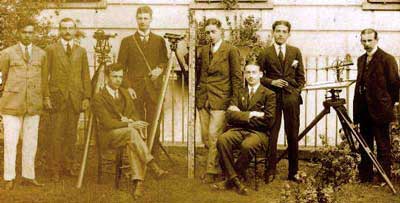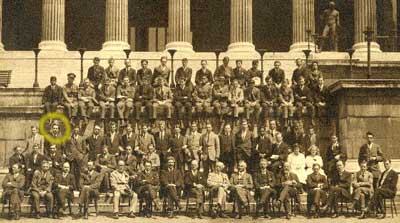|
|
Nathan
Percy Graham – 'Percy'
|
|
| |
by
Benjamin Ifor Evans, 1920
|
|
 NATHAN
PERCY GRAHAM was born in London on August 30th, 1895.
He entered the Classical side of the City of London
School in 1907, and remained there 'til the summer
of 1914. It was characteristic of his versatility
that he obtained first the Sir William Tite Scholarship
in Classics, which he declined, and then the John
Travers Scholarship in Science with which he proceeded
in October 1914 to University College, London, and
where he joined the Faculty of Engineering.
NATHAN
PERCY GRAHAM was born in London on August 30th, 1895.
He entered the Classical side of the City of London
School in 1907, and remained there 'til the summer
of 1914. It was characteristic of his versatility
that he obtained first the Sir William Tite Scholarship
in Classics, which he declined, and then the John
Travers Scholarship in Science with which he proceeded
in October 1914 to University College, London, and
where he joined the Faculty of Engineering.
Early
in 1915 he joined the Officers' Training Corps, and
later in the year obtained a commission in the Royal
Garrison Artillery. He went to France with his battery
in August 1916 and was present at the Battle of Ypres,
Passchendaele and Messines. At this last place he
sustained shell-shock and went into hospital at St.
Omer. He was later removed to the Denmark Hill Hospital
and after two months' convalescence at Craiglockhart,
near Edinburgh, was invalided out of the army in December
1917. But he never recovered – his health had
been permanently undermined.
Graham
left the army a changed man, his whole mental and
spiritual outlook completely transformed by the experiences
through which he had passed.
In March
1918 he re-entered the Engineering Faculty at University
College and immediately threw himself with all his
energy into the work of reorganising the student life.
Within
a few weeks he was elected Editor of the Union Magazine
and brought to that journal at once more seriousness
and more wit. His own contributions were a solid background
to the literary matter he so successfully introduced.
The poem Piccadilly Circus illustrates adequately
the tone and thought he maintained, while a more ephemeral
revue of topical matters, Hullo Ukrainia, buries
with its lost illusions a large amount of too transient
humour. His success as an Editor induced his fellow
students to elect him President of the Dramatic society.
The result was a production of Prunella, executed
with taste and vigour. He was now among the best-known
figures in the life of the college and when the Union
Society, a mere wraith of its pre-war solidity, sought
again a student President it was to Graham that it
turned. He organised again with quietness and tact,
and built up once more those pleasant undergraguate
groups which had meant so much to students in the
sunny pre-war days. He became Treasurer too of a newly-formed
Socialist Society. He was attracted to this movement
more as an idealist than as a politician – more
by the Republic of Plato than by Das Kapital
of Marx. He became interested too in local politics
and was elected Propaganda Secretary of the Stoke
Newington Labour Party. He followed Socialism and
Labour, together with so many of his young contemporaries,
not as a creed or a party, but because it seemed that
the Vision of Truth had led him here, though not to
rest.

Percy (sitting right)
and engineering colleagues c.1914 or 1918-20
Graham
did not allow his political and other activities to
interfere with his reading. He was not only familiar
with the chief English and Classical authors, but
his amazing energy made it possible for him to read
widely in modern French, German, Italian and Spanish,
whilst the catholicity of his taste is sufficiently
illustrated by the fact that at the time of his death
he had made some progress in both ancient Egyptian
and modern Welsh! It was during his college career
too that he wrote most of his shorter poems.
In the
meantime, in June 1919, he had obtained an Honours
B.Sc. Degree in Engineering and after a few months'
private study he passed the intermediate Examination
in the Faculty of Arts.
In April
1920 he took up a post as engineer in Bolton, Lancashire.
He found the work and the atmosphere uncongenial and
he formed the intention of abandoning engineering,
for which he had never cared, and of settling in some
quiet cathedral city where he could devote himself
entirely to literature. But death overtook him before
he could carry it into effect. He succumbed to an
attack of heart failure on June 20th, 1920.

Percy (circled) and colleagues at University College,
London, c.1914 or 1918-20
(Click photo to enlarge)
Graham
was among that heroic generation which went into the
war because it believed that the principle of Freedom
was at stake. He lived long enough to realise that
the simple faith which inspired men in 1914 was never
to be realised. The sight of youth's sacrifice becoming
but a counter of the political game stirred in him
a strain of iconoclasm foreign to his real nature.
"After
all," he wrote, "the Latin trado
means I betray as often as it means I hand
down." Passionately he dedicated himself
to the cause of Youth, for Youth alone could regenarate
the world.
He found
a newer, harder faith in no recognised creed, nor
in any established church. During the last few months
before his death he worked at a long poem, Phaethon.
His belief and thought are seen there remodelling
themselves, through sorrow and passion and the heavy
experience of many things, into an organic, a creative
faith that Truth must be discovered by each man in
the travail of his own soul.
"No
man's religion," he wrote, "can be complete
'till he dies." "The duty of a father or a teacher is
not to pump in creeds or faiths but to plough and
fertilise the soil in which growing consciousness
can sow its own seeds." It was not a belief in
any materialist conception of history, but a desire
to make man free for spiritual progress that made
Graham a Socialist. He desired to emancipate men from
the economic servitudes which prevented them from
giving full play to their creative energies; he desired
to break down the barriers which stood between men
and their vision.
In Phæthon
he has reached a vision of life not unlike that of
Shelley in his Italian period. He is still sensitive
to the cruelty and pain which wreaths Life in its
embrace, but he sees standing out magnificently clear
some one, unchangeable purpose. He writes:
| |
Oh
God, or poesy, or great ideals
Oh, they are one – this mighty trinity.
One bond of life above three diverse seals,
One stream through different springs!
|
|
And if
it should be false – the God, the poesy and the
ideals, the fear sweeps over him for a moment –
life would still be worthwhile, the dream would in
itself suffice:-
| |
 Dream
on – and thou, Dream
on – and thou,
Thou meek handmaiden pale and timorous,
Poor Poesy! dear Poesy! Tho' brief
My feeble flight, tho' week my wings unfurled
Across the rainbow sky, tho' death await
And darkness be my meed, oh aid me now. |
|
He felt,
as did Shelley, that men were following the transitory,
worthless things, and that the Spirit of Life was
left solitary and neglected:-
| |
If
but the music of the songs I sing,
If but the fragrance of the flowers I wind
Into a heavenly coronal, can bring
The vision of my God, so long a wraith
Unseen by tributary minds.
|
|
He closes
his envoi to Phæthon with a recapitulation
of his poetic faith:-
| |
If
but the dreams I dream, and thro' the skies
Send earthwards, clothed in majesty of song
Unwound from the magic weaving of thy lute
Oh Poesy, should wake a chord along
The world's wide resonance, that hearts now
mute
May seize some wandering tremor from its sound
And organ-like, give back an answering note
If but in stagnant souls and visions bound
With bonds accursèd
and with vows immote
To one fixed image, graven of spiritual stone
Some wandering thread of song at last should
seek
And with a godlike instinct find the throne
Of God who is within.
|
|
Phæthon
is an intensely subjective poem, as unintelligible
in itself as Shelley's Alastor, yet although
he speaks here of himself and his beliefs, the portrait
is not complete. Phæthon, a serious philosophic
poem, gave no scope for that gentle sense of humour
which lightened his thought and made his company so
evenly pleasant to his friends. He delighted in words
themselves, to trick and play with them, and some
of his puns would have made even an Elizabethan blush.
It is thus perhaps that he should be remembered, sad
with much that he has seen, strong in faith which
demands Life and not Rest, quiet as in thought, but
with his whole being ready to catch every glance of
a smile. He saw the Ideal and dedicated to it a splendid
loyalty, and in its service his ardent spirit flamed
itself away.
B.I.E
~1920~
|
|
Nathan
Percy Graham – 'Percy'
|
|
| |
by
Benjamin Ifor Evans, 1920
|
|